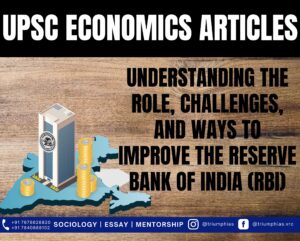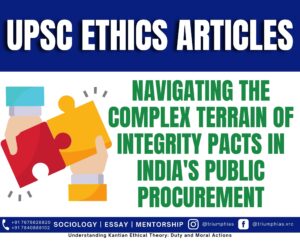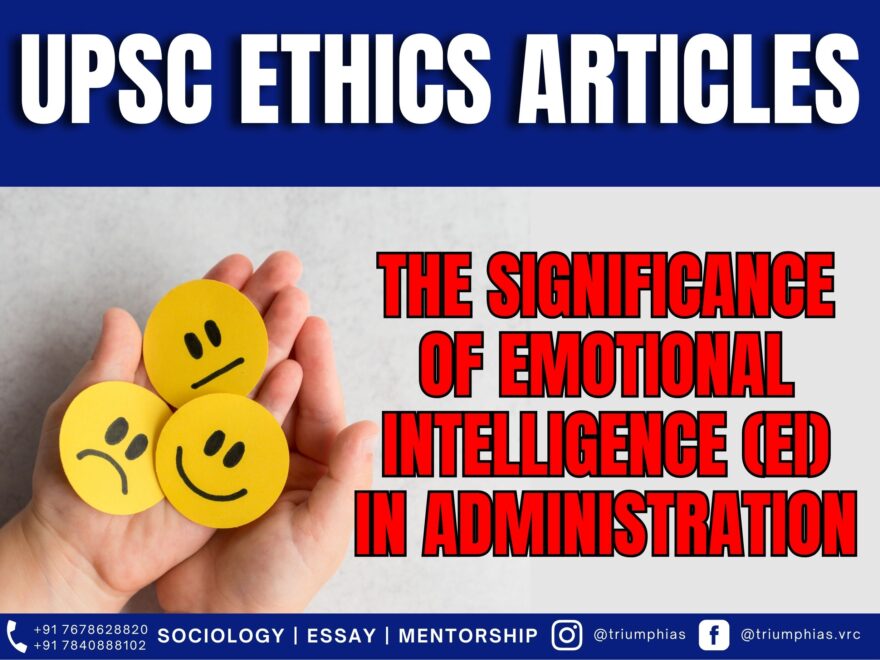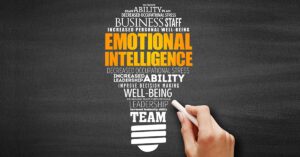Emotional Intelligence in Administration
(Relevant for Ethics, Integrity and Aptitude)
Emotional Intelligence (EI)
Emotional Intelligence (EI) entails the capacity to identify both one’s own and others’ emotions accurately. Emotional Intelligence facilitates the differentiation of various emotions and the skill to appropriately categorize them, thereby utilizing emotional insights to influence cognitive processes and actions. It aids in harnessing emotions to support thinking and in conscientiously managing emotions to foster both emotional and intellectual development.
Emotional Intelligence (EI) is, therefore, essential in addressing the challenges faced in administration, such as political interference, communication with individuals, and conflict resolution, among others.
- Teamwork and Collaboration: Emotional Intelligence empowers an individual to harness the emotional energy of others, fostering team morale and achieving collective objectives. For instance, during the Kerala floods, IAS officers led by example by actively participating in relief efforts, motivating their team members.
- Effective Coordination with Political Leaders: Emotional Intelligence equips individuals with the ability to manage emotions in high-pressure situations. It aids in bridging gaps between differing political ideologies and working diplomatically with leaders from diverse backgrounds. For instance, an IAS officer may respectfully disagree with a superior’s policy but still fulfill their duty to execute orders.
- Enhanced Policy Targeting: In governance, understanding the emotions and motivations of the target population is crucial for effective policymaking. For example, Operation Sulaimani, initiated by an IAS officer, ensures that no one in Kozhikode goes hungry, promoting the right to food without bureaucratic delays.
- Fostering Creativity: Emotionally intelligent individuals are more inclined to explore new avenues, take calculated risks, and embrace challenges, leading to innovative problem-solving. For example, IAS officer Bharati Holikeri encouraged antenatal check-ups at primary healthcare centers by introducing nutritious lunches for pregnant women through nearby Anganwadi centers, without straining the government’s finances.
- Conflict Resolution: Emotional Intelligence plays a vital role in managing unforeseen situations based on intuition, experience, and ethical considerations, especially during public unrest. For instance, the recent conflict between Delhi police and lawyers could have been de-escalated through the application of emotional intelligence. Similarly, addressing the Sabarimala issue required police officials to demonstrate emotional intelligence.
- Effective Communication: Emotionally intelligent civil servants excel in communicating policies and fostering positive relationships with subordinates and the general public.
- Stress Management: Emotional Intelligence enables individuals to handle emotions during stressful situations, contributing to their physical and mental well-being. For example, the Coimbatore Police launched the “Well Being” initiative to manage stress among its personnel.
Emotional intelligence (EI) forms the juncture at which cognition and emotion meet. It facilitates our capacity for resilience, motivation, empathy, reasoning, stress management, communication which remains the bedrock for running any administration and effective governance.
Sample Question for UPSC Sociology Optional Paper:
-
Question: What is Emotional Intelligence (EI), and how does it benefit civil servants in administrative roles?
Answer: Emotional Intelligence involves the ability to recognize and manage emotions, benefiting civil servants in areas such as teamwork, conflict resolution, and stress management. - Question: How can Emotional Intelligence enhance policy targeting in governance?
Answer: Emotional Intelligence helps civil servants understand the emotions and motivations of the target population, leading to more effective policymaking. - Question: Provide an example of how Emotional Intelligence was applied in a real-world administrative scenario.
Answer: In Operation Sulaimani, an IAS officer used Emotional Intelligence to ensure that no one in Kozhikode went hungry, promoting the right to food without bureaucratic delays. - Question: Why is Effective Communication considered a key aspect of Emotional Intelligence in administration?
Answer: Effective communication fosters positive relationships with subordinates and the general public, enhancing governance and administrative efficiency. -
Question: How does Emotional Intelligence contribute to stress management among civil servants?
Answer: Emotional Intelligence enables individuals to handle emotions during stressful situations, promoting their physical and mental well-being, as seen in initiatives like the Coimbatore Police’s “Well Being” program.
Related Blogs …
 |
 |
To master these intricacies and fare well in the Sociology Optional Syllabus, aspiring sociologists might benefit from guidance by the Best Sociology Optional Teacher and participation in the Best Sociology Optional Coaching. These avenues provide comprehensive assistance, ensuring a solid understanding of sociology’s diverse methodologies and techniques.
Emotional Intelligence in Administration, Emotional Intelligence, EI, Administration, Governance, Teamwork, Conflict Resolution, Effective Communication, Stress Management, Policy Targeting, Creativity, Civil Servants, Ethical Considerations, Administration, Governance, Teamwork, Conflict Resolution, Effective Communication, Stress Management, Emotional Intelligence in Administration

Choose The Best Sociology Optional Teacher for IAS Preparation?
At the beginning of the journey for Civil Services Examination preparation, many students face a pivotal decision – selecting their optional subject. Questions such as “which optional subject is the best?” and “which optional subject is the most scoring?” frequently come to mind. Choosing the right optional subject, like choosing the best sociology optional teacher, is a subjective yet vital step that requires a thoughtful decision based on facts. A misstep in this crucial decision can indeed prove disastrous.
Ever since the exam pattern was revamped in 2013, the UPSC has eliminated the need for a second optional subject. Now, candidates have to choose only one optional subject for the UPSC Mains, which has two papers of 250 marks each. One of the compelling choices for many has been the sociology optional. However, it’s strongly advised to decide on your optional subject for mains well ahead of time to get sufficient time to complete the syllabus. After all, most students score similarly in General Studies Papers; it’s the score in the optional subject & essay that contributes significantly to the final selection.
“A sound strategy does not rely solely on the popular
Opinion of toppers or famous YouTubers cum teachers.”
It requires understanding one’s ability, interest, and the relevance of the subject, not just for the exam but also for life in general. Hence, when selecting the best sociology teacher, one must consider the usefulness of sociology optional coaching in General Studies, Essay, and Personality Test.
The choice of the optional subject should be based on objective criteria, such as the nature, scope, and size of the syllabus, uniformity and stability in the question pattern, relevance of the syllabic content in daily life in society, and the availability of study material and guidance. For example, choosing the best sociology optional coaching can ensure access to top-quality study materials and experienced teachers. Always remember, the approach of the UPSC optional subject differs from your academic studies of subjects. Therefore, before settling for sociology optional, you need to analyze the syllabus, previous years’ pattern, subject requirements (be it ideal, visionary, numerical, conceptual theoretical), and your comfort level with the subject.
This decision marks a critical point in your UPSC – CSE journey, potentially determining your success in a career in IAS/Civil Services. Therefore, it’s crucial to choose wisely, whether it’s the optional subject or the best sociology optional teacher. Always base your decision on accurate facts, and never let your emotional biases guide your choices. After all, the search for the best sociology optional coaching is about finding the perfect fit for your unique academic needs and aspirations.
To master these intricacies and fare well in the Sociology Optional Syllabus, aspiring sociologists might benefit from guidance by the Best Sociology Optional Teacher and participation in the Best Sociology Optional Coaching. These avenues provide comprehensive assistance, ensuring a solid understanding of sociology’s diverse methodologies and techniques. Sociology, Social theory, Best Sociology Optional Teacher, Best Sociology Optional Coaching, Sociology Optional Syllabus.
Best Sociology Optional Teacher, Sociology Syllabus, Sociology Optional, Sociology Optional Coaching, Best Sociology Optional Coaching, Best Sociology Teacher, Sociology Course, Sociology Teacher, Sociology Foundation, Sociology Foundation Course, Sociology Optional UPSC, Sociology for IAS,
Follow us :
🔎 https://www.instagram.com/triumphias
🔎https://www.youtube.com/c/TriumphIAS
https://t.me/VikashRanjanSociology
Find More Blogs
|
Scope of the subject and comparison with other social sciences |
|||
|
|
|
|
Modernity and social changes in Europe |


